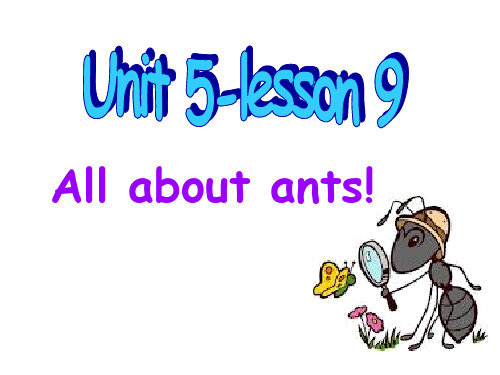新概念青少版2aUnit5电子版本
青少版新概念2A-unit5 All about ants 课件

4.What do ants always do in the morning?
They always stech their legs.
Watch the video!
1.The webpage is about ants,isn't it?
No,they don't.
5.Ants usually yawn in the morning, too, don't they?
Yes, they do.
1
2
3
ant
webpage look up
5 survive
6 week
7
breathe
4 place
8 week
9
website
10
insect
While-listening
1.Are ants really interesting?
Yes, they are.
2.Do they live in wet places?
No, they aren't. They live in dry places.
3.Why is Robert looking up ants?
Grammar Points 1
Look at this webpage. look at+对象(n./pron)
看
Practice
Look at __m_e__. (I) Look at __he_r__. (she) Look at __hi_m__. (he) Look at __th_e_m_. (they) Look at __us___. (we)
青少版新概念2A_unit5(共23页)

ant 蚂蚁
joke 开玩笑
webpage 网页
yawn 打哈欠
look up 查阅
funnily enough 十分有趣的
place 地方,地点 arm 手臂,上肢
survive 幸存,
evening 傍晚,黄昏
week 星期
also 也,并且
breathe 呼吸
insect 昆虫
stretch 伸展肢体
D: Forty miles to a town! I can’t believe it!
Answer
1. On Saturdays. 2. Bread. 3. No, she doesn’t. 4. No, she doesn’t. 5. She doesn’t often drive to Perth because it
D: But where do you buy your food?
L: We’re near the sea. I get beautiful fish from the boats. And I can buy a lot of things from the village shop. It’s sometimes a bit difficult in winter. But it’s OK.
evening? 5. Do they usually laugh in the morning, too?
1. Where do ants usually live? 2. How long can they survive under water? 3. Do ants breathe under water? 4. When do ants always stretch their legs? 5. What do they also do in the morning?
新概念青少版2AUnit5 Lesson10

Let’s spell直接拼读 /pa:/ /ba:/ /ta:/ /da:/ /ka:/ /ga:/ fa:/ /sa:/ /za:/ /wa:/ /ra:/ /la:/ /ja:/ /ha:/
Let’s spell合成拼读 /pa:s/ /ba:k / / sta: / / ga:d / / ha:f / /la:f/ / gla:s / / kla:s / / da:k/ / a:sk /
2.当分钟数是15分钟,45分钟时,可用名词 quarter表示。15分钟又叫一刻钟:a quarter
如:9:15 (三种方法)
11:45
3. 如果分钟数少于等于30分钟,用介词past 表示,用“分钟 + past + 小时”,表示“几 点几分”。 如:6:10 4:20
10:25
4.如果分钟数多于30分钟,可以用“(相差的) 分钟 +介词 to + (下一)小时”,to意思是 “差”
Every day
写出你每天通常在某个时间会做的一件事。 例: I usually--- get up---6:30 (in the morning)
I always--- go to school---7:40 (in the morning) I usually--- arrives home--4:55(in the afternoon) I usually--- do my homework---7:10 (in the afternoon) 然后读给另一个同学听,另一个同学要记下来,并复述。
New words and Expressions
work 工作
telephone call 电话
arrive 到达
青少版新概念英语2A_unit5(共17页)44

back airport pocket medal
curtain picture letter pleased
top hour hero walk
back airport pocket medal
curtain picture letter pleased
New words and expressions:
Make sentences
Look at this webpage. It’s about ants.
Why are you looking up ants?
Why not? Ants are really interesting. Ants can survive under water for
1.(Am/Is/Are)+主语+其它
Is he an office worker?(Yes, he is. /No, he isn't.)
2. Do+主语(除第三人称单数)+动词原形+其它
Do you get up at six everyday? (Yes, I do./No, I don't.)
noodles very much. they read English everyday?
in the classroom.
( aren't does likes is Do )
改写句子
1)Nancy is a girl.(改一般疑问句→肯定回答) 2)Are they good friends?(肯定回答) 3)They always make cake together.(改否定句) 4)He doesn't go to school by bus. (改肯定句) 5)I want a hamburger.(改一般疑问句→否定回
青少版新概念2A_unit5

1.(Am/Is/Are)+主语+其它
Is he an office worker?(Yes, he is. /No, he isn't.)
2. Do+主语(除第三人称单数)+动词原形+其它
Do you get up at six everyday? (Yes, I do./No, I don't.)
3. Does+主语(第三人称单数)+动词原形+其它
Does your father usually go to work by bus?
(Yes, he does./ No, he doesn't.)
填空
1)What
your brother do?
2)He
a student.
3)Amy
noodles very much.
(5)表示平日的喜好。 I like bananas. We don’t like vegetables. He likes ice cream. She doesn’t like strawberries.
在一般现在时中,当主语是第三人称单数时,谓语动词要用第 三人称单数形式,即常在动词原形后加-s或-es。 但有些同学们 对于哪些主语是第三人称单数还不十分清楚。现归纳总结如下: 一、人称代词he, she, it是第三人称单数。 如: He likes watching TV. 他喜欢看电视。
(1)表示事物或人物的特征、状态。 e.g.:天空是蓝色的 The sky is blue. 玛丽的爸爸是一名英语老师 Mary’s father is an English teacher.
(2)表示经常性或习惯性的动作。 e.g.:我每天六点起床。 I get up at six every day. 她每天都做运动 She plays sports every day.
新概念青少版2aUnit5

Robert: Well, f_________, they do!
Lesson 10 Pronunciation
[æ ] ant
had [a:] arm park
at
match art part
back
packet aunt father jars
cat
salad March
garden
工作
work
at eight (o'clock) in the morning.
4 A: They don't go to school in the morning. B: Yes, they do! They go to school
at eight o'clock.
5 A: They go to school in the evening. B: No, they don't! They go to school
look up (1)抬头看,向上看 (2)(在词典、时刻表等中)查看……
ROBERT: Why not? Ants are really interesting. They do really interesting KAREN: What …… kind of things? ① Why not (1) 为什么不 ?为什么不行?
breathe
evening
insect
also
week
arm
joke
use
look up
breathe
Describe the pictures
Robert: Look at this webpage, Mum. It’s about ants. Karen: Ants? Why are you looking up ants?
青少版新概念2Aunit5

课文讲解
课文主题:介绍英国伦敦著名景点
课文内容:通过对话形式介绍伦敦塔桥、大本钟和伦敦眼等景点
教学目标:让学生掌握基本句型和常用表达方式,提高口语表达能力
教学方法:采用情景教学和任务型教学相结合的方式,引导学生积极参与课堂活 动
练习题解析
练习题目的类型和 难度
练习题目的解题思 路和方法
练习题目的答案和 解析
xx
PART TWO
教学内容
语法知识
内容:介绍一般现在时的用法
教学方法:通过例句和练习,让学 生在实际运用中掌握一般现在时的 用法
添加标题
添加标题
添加标题
添加标题
目的:通过学习一般现在时,让学 生掌握基本的时态结构,理解时间 表达的意义
练习:提供相关的练习题,帮助学 生巩固所学知识
词汇学习
重点词汇:掌握
xx
PART FOUR
教学评价
课堂表现评价
学生参与度:评价学生在课堂上的参与程度,包括回答问题、小组讨论等。 课堂纪律:评价学生在课堂上的纪律表现,如是否遵守课堂规则、是否认真听讲等。 学习态度:评价学生的学习态度,如是否认真完成作业、是否主动学习等。 学习成果:评价学生的学习成果,如考试成绩、作业质量等。
提前预习,熟悉课文内容
积极参与课堂活动,多与老师 和同学互动
注重听说训练,提高语言运用 能力
课后及时复习巩固,加深记忆 和理解
针对教师的建议
制定详细的教学 计划,确保教学 内容的完整性和 系统性。
注重培养学生的 听说能力,通过 多种教学活动提 高学生的口语表 达能力。
结合教材内容, 适当引入文化背 景知识,帮助学 生更好地理解语 言背后的文化内 涵。
青少版新概念2A unit5 。

• survive
v.
幸存,生存下来.
• 猜一猜: She is the only one to survive the crash.
飞机失事
• 她是飞机失事中唯一的幸存者。
• week
n.
星期
• 扩展:weekdays weekends
• breathe
v.
呼吸 .. 呼吸
• 扩展:breath n.
新概念英语青少版2A
Warm-up
Greeting...
Free talk:
What’s your favorite animal?
1.Do you know something about ants? 2.Do you think ants are really interesting?
• 猜一猜:I lose失去 my breath after 1000 meters running. • Music is the breath of life(生命) to him.
• stretch v. 伸展肢体…. • 猜一猜:Do not stretch the truth. 真相 • He gets up and stretches himself.
• Rubber stretches easily. 橡胶 • I go outside to stretch my legs.
• yawn v. 打呵欠 • He stretched himself with a yawn. 他打了个呵欠伸了伸懒腰。
Why do people yawn?
• leg n. 腿,下肢 • joke v. 开玩笑 • 扩展:n. That's only a joke. 那只不过是句玩笑话.
(完整word版)青少版新概念2A 课文文本(含参考译文) Unit 1-15

青少版新概念2A 课文文本Unit 1—15Unit 1: Linda comes to London 琳达来到伦敦LINDA: Hi, Karen! Where are you?KAREN: I'm in the coffee bar next to the Arrivals exit。
I'm waiting for you, and I'm having a cup ofcoffee.KAREN: Where are you, and what are you doing?LINDA: I'm in the Baggage Hall. I'm waiting for my suitcase。
LINDA: Ah, I can see it!It’s coming round now! There it is!LINDA: Oh, Karen! Is Paul with you?KAREN: Yes, of course he is。
He's standing here beside me. I'm giving him my phone now.KAREN: Here you are, Paul! Talk to your mother!PAUL: Hello, Mum!LINDA: Hello,Paul! I've got my suitcase, and I’m coming out now!琳达: 嗨,卡伦!你在哪儿?卡伦:我在进港出口旁的咖啡馆。
我正在一边等你一边喝咖啡。
卡伦:你在哪儿?在做什么?琳达:我在行李领取厅,在等我的皮箱。
琳达: 啊,我看到箱子了!马上就转过来了!到了!琳达:哦,卡伦!保罗和你在一起吗?卡伦: 当然在。
他就站在我身旁。
我现在把电话给他。
卡伦: 给,保罗!和你妈妈说说话!保罗:你好,妈妈!琳达:你好,保罗!我拿到皮箱了,马上就出来!Unit 2:Good luck on Sunday! 祝你周日好运!REPORTER: My name’s Tom French。
青少版新概念英语2A-Unit5

• Karen: What kind of thing?
青少版新概念英语2A-Unit5
• Robert: Well, they__us_ua_ll_y live in _d_ry_places. But they can__su_rv_iv_e under water for__two_ weeks.
疑问句→ Is she your sister?
②陈述句:I can play soccer. 否定句→ I can not /can’t play soccer 疑问句→ Can you play soccer?
Yes,Ican./ No, I can’t.
青少版新概念英语2A-新概念英语2A-Unit5
总是,一直 通常 经常 有时
很少,几乎不 从不,决不
Grammar Point 5
• They can survive under water for
two weeks.
Practice: 她每天看两小时电视。 他每天睡觉八小时。 我爸爸每天早上跑步两小时。
New words and expressions:
ants
蚂蚁
insect
昆虫
webpage 网页
website
网站
look up
查阅
yawn
打哈欠
青少版新概念英语2A-Unit5
New words and expressions:
breathe stretch survive
呼吸 伸展肢体
幸存,生存下来
--About 3:30.
青少版新概念英语2A-Unit5
Grammar Point 3
• Why are you looking up ants?
青少版新概念英语2A-Unit5精讲+听力+答案共53张PPT)

Grammar Point 2
• It’s about ants.
关于
• • • •
Translation (翻译) What’s this about? This song is about friendship(友谊). --What time is it now? --About 3:30.
Grammar Points 1
• Look at this webpage.
看
• • • • • •
Practice Look at _____. (I) Look at _____. (she) Look at _____. (he) Look at _____. (they) Look at _____. (us)
Grammar Point 3
• Why are you looking up ants? • Why not? Ants are really interesting.
“为什么不呢”, 我们可以用 “why not” 来回答“why”引 导的特殊疑问句
Grammar Point 4
• They usually live in dry places. • They don’t usually live in wet places.
• Robert: Why not? interesting • Ants are really______. They do really interesting things. • Karen: What kind of thing?
usually live • Robert: Well, they_____ in ___places. But they dry can_____ two survive under water for___ weeks. • Karen: Really?
青少版新概念2A Unit5

• Karen: Do they usually yawn ____in the morning, too? funnily enough • Robert: Well,____________, they do!
Language Point 7
• Karen: Do they usually yawn in the morning, too? • Robert: Well, funnily enough, they do!
• It’s about ants.
关于
• • • •
Translation (翻译) What’s this about? This song is about friendship(友谊). --What time is it now? --About 3:30.
• Robert: Why not? interesting • Ants are really______. They do really interesting things. • Karen: What kind of thing?
Find out key words of each part , then role play!!
Now let’s read lesson 9 for 3 minutes and
answer the questions.
• Ask questions about the text • 1. • ants/do/interesting things? • →Ants do interesting things. • →Do ants do interesting things? • What kinds of things......? • →What kind of things do ants do?
第5周 新概念英语青少版2A_Unit5

Robert:
It doesn’t say.
Robert: Oh, Mum, how about this ?
Ants always stretch their legs in the morning. Karen: You’re joking !
Robert: No, really !
Karen: Do they usually yawn in the morning ,too ? Robert: Well, funnily enough, they do ?
P37
Questions
1. Do they do really boring things? No, he aren’t. They do really interesting things. 2. Do they usually live in wet places? No, they don’t. They usually live in dry places. 3. Can they survive under water for two months? No, they can’t . They can survive under water for two weeks. 4. Do ants always stretch their legs in the evening ? No, they don’t. They always stretch their legs in the morning.
Robert:
It doesn’t say.
1.来杯咖啡怎么样? How about a cup of coffee?
=what about..”怎么样”
Robert: Oh, Mum, how about this ?
青少版新概念2A Unit5 All about aunts

上午在英语中的表达是:a.m./ A.M. 下午在英语中的表达是:p.m. / P.M. 准确的几点几分介词用at,通常时间用到 句首或句末
I always get up early.
I sometimes get up at 5:30. I never get up at 12:00.
一, 整点 8点整就是:eight o'clock 二,从8点零一分开始到8点30分,都可以用一个词:past. (past表示已经 过去的时间) e.g. 8:05 -- five past eight quarter表示四分之一(15分钟) 8:15 -- quarter past eight half表示一半 8:30 -- half past eight 三,从8点31分开始到8点59分,都可以用一个词:to. (to表示即将接近的时间) e.g. 8:32 -- twenty-eight to nine. 四,直接说时间:eight thirty-two 8:32 上午在英语中的表达是:a.m./ A.M. 下午在英语中的表达是:p.m. / P.M. 准确的几点几分介词用at,通常时间用到句首或句末
I go to the Wal-Mart every week.
I always buy vegetables and fruits.
I usually buy apples and bananas . I sometimes buy milk and ice cream.
I never buy fish.
2.When do ants always stretch their legs?
青少版新概念2A_unit5(共23页)

ant 蚂蚁
joke 开玩笑
webpage 网页
yawn 打哈欠
look up 查阅
funnily enough 十分有趣的
place 地方,地点 arm 手臂,上肢
survive 幸存,
evening 傍晚,黄昏
week 星期
also 也,并且
breathe 呼吸
insect 昆虫
stretch 伸展肢enough, they do!
Answer questions about the text.
1. The webpage is about ants, isn’t it? 2. Ants aren’t boring, are they? 3. They’re really interesting, aren’t they? 4. They usually live in dry places, don’t they? 5. They can survive under water for two
Unit 5 All about ants!
Listening and Understanding .
Listen to the recording, and then answer this question:
What do ants always do in the morning?
New words and Expressions
evening? 5. Do they usually laugh in the morning, too?
1. Where do ants usually live? 2. How long can they survive under water? 3. Do ants breathe under water? 4. When do ants always stretch their legs? 5. What do they also do in the morning?
青少版新概念2A U5

7: 15 go shopping
8:25
watch TV
gets up 7:30 the morning She usually ______at_____in______.
I usually_____ at ____in the_____.
7:30
8:30 2:10
6:00 7: 15
8:25
n.退,下肢
New Words and Expressions
work [wə:k] n. 工作 arrive [ə'raiv] vi. 到达, 到来 prepare [pri'peə] v. 预备, 准备 go for a walk 去散步 telephone call ['telifəun ,kɔ:l] 电话 write [rait] v. 写 email [‘i:meil] n. 电子邮件
Is he taking down the picture? Your subtopic goes here
Yes, he is
Are you putting up the curtains? No, we aren’t. We are taking down the curtains.
6.We are putting up the curtains. (变成一般疑问句,并否定回答)
ant
joke
stretch
arm
week Look up
evening
时间介词的用法,还记得吗?
at
on
时间点
某一天
in
较长的时间段
go to work
in the morning at eight o'clock
青少版新概念英语2AUnit5省名师优质课赛课获奖课件市赛课一等奖课件

What time is it?
It’s a quarter past two.
What time is it?
It’s half pas five.
What time is it?
It’s twenty to eight.
What time is it?
It’s a quarter to nine.
3)They always make cake together.
(改否定句)
4)He doesn't go to school by bus.
(改肯定句)
5)I want a hamburger.
(改一般疑问句→否定回答)
Karen: Do they usually yawn in the morning, too?
Robert: Well, funnily enough, they do!
表达they yawn; do 在这里指代前面出 现过旳动词,防止反复出现。
go to school
arrives home
二.只有主语在第三人称单数时用动词旳“三单形式”, 其别人称用动词原形。
动词三单形式旳变化规则: (1)多数直接在动词词尾加-s
play — plays like — likes ask---asks work---works get---gets call---calls (2)以字母s, x, ch, sh或o结尾旳动词,在词尾直接加es. watch---watches wish---wishes do---does go---goes (3)以“辅音字母加- y”结尾旳动词,要先变y为i再加es try---tries study---studies cry---cries fly---flies 不规则变化: be--- is have----has
青少版新概念2AUnit5

在一般现在时中,当主语是第三人称单数时,谓语动词要用第 三人称单数形式,即常在动词原形后加-s或-es。归纳总结如下: 一、人称代词he, she, it是第三人称单数。 如: He likes watching TV. 他喜欢看电视。 She has lunch at twelve. 她十二点吃午餐。 二、单个人名、地名或称呼作主语;是第三人称单数。 如:Han Mei likes salsd . 韩梅喜欢萨拉。 Beijing is in China. 北京在中国。 Uncle Wang often plays volleyball.. 王叔叔经常打排球。 三、单数可数名词或“this / that / the+单数可数名词”作 主 语时,是第三人称单数。 如:This book is yours. 这本书是你的。 That car is red. The cat is Lucy’s. 这只猫是露茜的。
Find the errors:
1. I’m have a cup of coffee . 2. I’m giving him mine phone now.
3. There are hundred of people in the park.
4. Are you looking forward to on Sunday ? 5. This note belong to Paul . 6. It look like Paul’s “to –do ”list. 7. How do you feeling ? 8. You are in the top three percents ! 9. Don’t take your gloves on.
(改一般疑问句→否定回答)
Tom always yawns in the morning.
青少版新概念英语2A Unit5ppt课件

Grammar Point 3
• Why are you looking up ants?
• Why not? Ants are really interesting.
“为什么不呢”, 我们可以用 “why not” 来回答“why”引
导的特殊疑问句
25
Grammar Point 4
• They usually live in dry places. • They don’t usually live in wet places.
4
T or F
•Ants always stretch their legs in the morning.
5
T or F
•Ants usually yawn in the evening.
6
ant
7
webpage
8
breathe
9
stretch
10
yawn
11
insect
12
New words and expressions:
一般现在时表示经常发生的、习惯性的动 作或存在的状态。其时间状语为often、 usually、 always、 sometimes等频率副 词,on Saturdays、 in the morning(afternoon/ evening) 、every day( week/year ) 等.
49
• Karen: Really?
19
• Karen: Do they __bre_ath_e _under water?
• Robert: It doesn’t say.
20
• Robert: Oh, Mum, how about this? Ants always ____thstereitcrh legs in the____m_orn.ing
- 1、下载文档前请自行甄别文档内容的完整性,平台不提供额外的编辑、内容补充、找答案等附加服务。
- 2、"仅部分预览"的文档,不可在线预览部分如存在完整性等问题,可反馈申请退款(可完整预览的文档不适用该条件!)。
- 3、如文档侵犯您的权益,请联系客服反馈,我们会尽快为您处理(人工客服工作时间:9:00-18:30)。
look up (1)抬头看,向上看 (2)(在词典、时刻表等中)查看……
ROBERT: Why not? Ants are really interesting. Theyห้องสมุดไป่ตู้do really interesting
①KWAhyRnEotN(1:) 为W什h么a不t …k…in?d为o什f么t不hi行n?gs?
Robert: Why not? Ants are really interesting. They do really interesting things.
Karen: What kind of things?
Robert: Well, they usually live in dry places. But they can survive under water for two weeks.
①usually 频度副词 通常放在助动词后或
主要动词前。
同类型词 often 、always、
every week、never、once、
twice
③Really在此处 只是作为
一个感叹词“真的吗?”“不② for 表目的,表原因、表时间……
会吧!”
for+一段时间 表示持续了多久
KAREN: Do they breathe under w ROBERT: It doesn’t say.
Put up _th_e__c_u_rt_a_in_s_. Take down _th_a_t_p_i_ct_u_r_e.
Discussion
Do you know ants? What do you think of them?
T or F
Ants usually live in wet places. Ants may breathe under water. Ants always stretch their legs in the morning. Ants usually yawn in the evening.
② In+时间段 表示“在……时候”
In+月份 on+星期几 at+时间点
KAREN: Do they uauslly yawn in the morning ,too?
ROBERT: Wel,funnily enough,th
①enough 副词 足够 置于形容词和副词之后
②do代替ants yawn 为避免重复, 指代前面出现的动词
evening
也 手臂 开玩笑
昆虫 网站 使用 打哈欠 十分有趣的 傍晚
ant
joke look up webside week survive
evening webpage use
funnily enough
leg
arm
Game time! stretch week place survive webside place
New Words and Expressions
ant webpage look up place
week breathe stretch leg
survive
查阅 星期 网页 地点 蚂蚁 幸存 腿 呼吸 伸展肢体
joke yawn funnily enough arm
also insect use website
Karen: Really?
Karen: Do they breathe under water? Robert: It doesn’t say.
Robert: Oh, Mum, how about this? Ants always stretch their legs in the morning.
Listen and follow!
Robert: l______ this webpage, Mum. It’s about ants. Karen: Ants? Why are you l_______ ants?
ROBERT: Oh, Mum, how about this? Ants always stretch their leg in the morning.
KAREN: Are you joking? ROBERT: No.really.
①How about……? ……怎么样? 意思与 What do you think… 后面接名词或doing
arm
insect
ant
use
yawn
also
leg breathe
funnily enough
evening
insect also
week arm
joke look up use breathe
Describe the pictures
Robert: Look at this webpage, Mum. It’s about ants. Karen: Ants? Why are you looking up ants?
Karen: You’re joking! Robert: No, really!
Karen: Do they usually yawn in the morning, too? Robert: Well, funnily enough, they do!
ROBERT: Look at this webpage , Mu It’s about ants
(2) 当然,好啊;请别客气
② Really 程度副词 和very一样,可以用 来加强它所修饰的词的意思。
ROBERT: Well,they usually live
in dry places.
But they can survive
under water for two wee
KARN: Really?
新概念青少版2aUnit5
Put on _y_o_u_r_g_lo_v_e_s_.
Take off _y_o_u_r_c_o_a_t.
Turn on __th_e__ra_d_i_o__. Turn off _th_e__te_l_e_vi_s_io_n_.
Pick up _th_o_s_e__le_t_te_r_s. Throw away _th_a_t_m__a_g_a_z_in_e.
